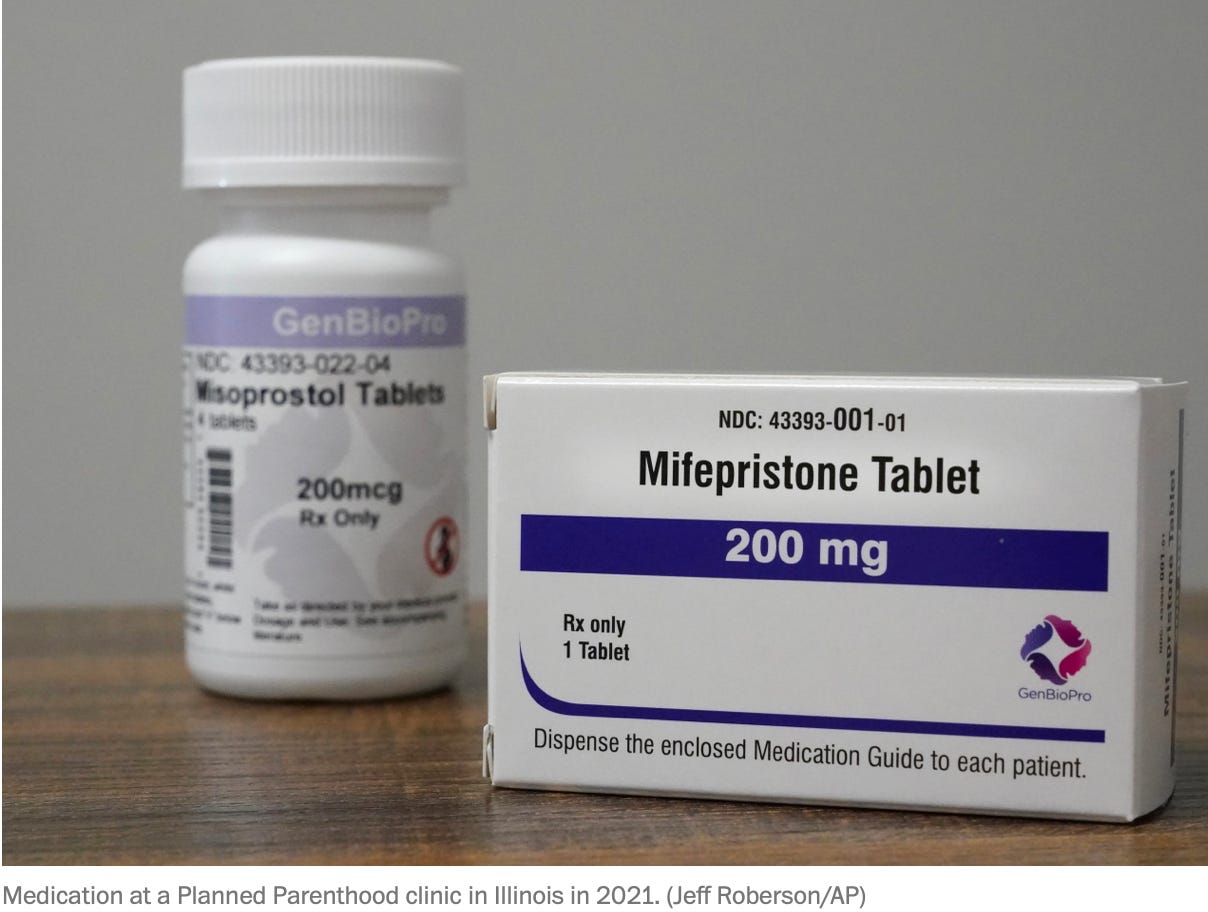Go Ahead; Make Your Laws If It Helps You Feel Better
Meanwhile, we'll be figure out how to defeat them before their even on the books
As Americans on both sides of the abortion argument begin to ponder a post-Roe world, one aspect has gone largely unnoticed. In an environment where many Americans get medications from overseas providers, medication abortions will remain accessible, even to women in red states.
As White, Christian, Conservative, and heterosexual members of the American Taliban continue to devise new and ever more onerous schemes to control, the net they can cast is not without holes. And you can bet that women will develop strategies for skirting obstacles men put in their way. As Madeleine Albright once said, there should be a special place in Hell for women who don’t help one another.
The end of a national right to abortion could trigger a surge of interest in a method of pregnancy termination that has become popular in states that already restrict the procedure: Abortion pills by mail.
Many Republican legislatures have tried banning the pills from being shipped or prescribed. But some women have been able to circumvent the restrictions by getting their pills online from overseas pharmacies that can’t be reached by U.S. laws. The five-day regimen of tablets usually comes in an unassuming envelope, making it hard to police. With the Supreme Court possibly poised to overturn Roe v. Wade , people seeking abortions in the United States will probably flock to these sources, experts say.
“This is just not going to be stoppable,” said Gerald Rosenberg, a law professor emeritus at the University of Chicago law school.
Medication abortions will almost certainly become the next frontier in the abortion war as red states look for ways to curb availability. Red states have inadvertently helped fuel the demand for mifepristone and misoprostol, the two drugs required for medication abortion.
The COVID-19 epidemic helped make it even easier for women to obtain these drugs as they became more comfortable with telehealth. In the roughly two dozen states with tight limits on abortion availability, women have used telehealth to get medication abortion pills despite laws in their states preventing such access.
There is no FDA requirement that the medication be taken in a clinical setting, and most patients already take it at home. Mifeprex is made by Danco Laboratories. A generic version is made by GenBioPro. Misoprostol is a common generic that is also used for stomach ailments.
In December, the FDA made permanent a covid-era policy allowing abortion pills to be prescribed via telehealth and distributed by mail in states that permit it. Even before the FDA action, abortions induced by pills rose to more than 54 percent of all U.S. abortions in 2020, according to the Guttmacher Institute, a research organization that supports abortion rights.
Still, physicians seeking to prescribe pills in states with limited access are facing a patchwork of restrictions, rules and bans on telehealth prescribing of abortion pills. The legal skirmishing promises to continue.
The problem faced by red state legislatures seeking to crack down on women is that they’re finding it challenging to keep up with technology. They may be able to exercise control over what occurs within their borders, but they have no jurisdiction over other states or countries. So a woman can see a doctor in another state or country via Zoom and have mifepristone and misoprostol mailed to her.
Because the US Mail is a federal concern and not subject to the whims of state law, states are left to find ways to apply their laws. Mailed pills are tough to monitor. Americans get billions of prescription and non-prescription pills shipped to them legally via the US Mail. How, then, is a state to ferret the pills shipped illegally, especially when they have no control over the mail?
Nineteen states ban the use of telehealth for medication abortion, but that’s an easy proscription to dance around. How would anyone other than an out-of-state doctor, patient, and pharmacy be aware of the transaction? The State can’t monitor the communication, and since the process takes place outside its borders, it has no jurisdiction. Even the mailing of the pills is beyond its purview because the feds control the mail.
The political environment threatens to pit state against state. Republican lawmakers in Missouri are considering a proposal to criminalize abortions that take place out of state. A Democratic bill advancing in the California legislature would protect patients and health-care providers from civil penalties in states that ban the practice. Another bill would protect the California licenses of abortion providers who offer care via telehealth in jurisdictions where the service is illegal.
In Alabama, Republican state Rep. Andrew Sorrell, sponsor of legislation that would ban abortions using pills, said overturning Roe would allow for the enactment of a 2019 state law making it a crime for a doctor to perform virtually any abortion. The law, which has been blocked by court challenges, would stop most, but not all, use of abortion pills, he predicted.
The reality is that anything a state makes illegal will ipso facto create a black market. Making abortion illegal won’t get rid of abortions- it will only drive them underground, resulting in greater risk to women. Likewise, making medication abortion illegal doesn’t mean it won’t be available and won’t happen. Instead, it means women will have to look farther afield, pay more, and perhaps take more significant risks with pharmaceuticals that may or may not have lower quality control practices in place.
The importation of mifepristone and misoprostol has yet to be approved by the FDA, so there’s the possibility that quality assurance may be less than optimal. Still, medication abortion, even from a foreign source, is almost certainly a better and safer option than a back-alley abortion at “Ye Olde Fred’s Abortion Mill.”
Overturning Roe v. Wade will by no means signal the end of abortion. As they always have, women of means will find ways to terminate an unwanted pregnancy safely. Women of lesser means are the ones who will bear the risks of self-managed abortion, which could place a woman at greater risk.
“The need for abortion will not go away,” said Abigail Aiken, an associate professor of public affairs at the University of Texas at Austin…. The result of state restrictions on medical abortions, she said, will lead to “an increase in self-managed abortion, outside the formal health-care setting. What we have seen is that every time states move to restrict abortion, there is an increase in self-managed abortions.”
Of course, these issues would be pointless if red state legislators recognized one specific but salient point: An unwanted pregnancy requires a penis. And where there’s a penis, there’s a man attached to it. As the current legal environment stands, no state recognizes a man’s responsibility in creating a child. The responsibility rests almost exclusively with the woman- she’s the one giving birth, so she’s responsible.
But what if, in situations where the father is known, that man is held financially responsible for the child he’s half-responsible for creating? His involvement in the process may have been little more than a squirt, but there wouldn’t be a pregnancy without his contribution. If a man is half-responsible for bringing a child into this world, he should bear half the responsibility, at least financially, for raising it.
Perhaps if more men understood the risk they’re assuming by having unprotected sex, they might behave more responsibly, if for no other reason than self-preservation. If a man isn’t ready to be a father, if he’s not in a place where he’s comfortable taking on the responsibilities that come along with getting someone pregnant, he has a decision to make. He can walk away or wear protection.
Let’s face it, guys; it’s not just about thinking with the wrong head. Once you get a woman pregnant, if you have any class and maturity, you don’t walk away from that responsibility. It’s yours every bit as much as the woman’s.
Perhaps it’s time for red (and blue) state legislatures to find ways to hold fathers responsible for unwanted pregnancies.
Until that happens- and it probably never will- women will continue to find ways to access medication abortion. States will search for ways to stop them, but if there’s one thing White, Conservative, Christian, and heterosexual men don’t understand, it’s a woman determined to end an unwanted pregnancy.
Laws mean nothing to a woman determined to get around rules made by men who can’t get pregnant and don’t give a damn about women. So good luck with that game of metaphorical “Whack-a-Mole,” guys.
Thank you for taking the time to read this. North Stars and Cowboy Bars is a reader-supported newsletter and a wholly-owned subsidiary of Abortions ‘R’ Us. I hope you’ll take a few seconds to join the party and support my work via a paid subscription. While you’re at it, why not forward this to a few like-minded friends who might enjoy it!! You can also donate via Venmo (@Jack-Cluth).






